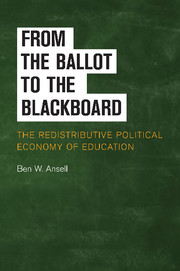Book contents
- Frontmatter
- Contents
- List of Tables
- List of Figures
- Preface
- 1 THE REDISTRIBUTIVE POLITICAL ECONOMY OF EDUCATION
- 2 THE EXPANSION OF EDUCATION TO THE MASSES: THEORY AND DATA
- 3 THE EXPANSION OF EDUCATION: HISTORICAL EVIDENCE
- 4 THE PARTISAN POLITICS OF EDUCATION
- 5 HIGH POLITICS IN HIGHER EDUCATION
- 6 CONCLUSION
- Bibliography
- Index
- Titles in the Series
6 - CONCLUSION
Published online by Cambridge University Press: 06 July 2010
- Frontmatter
- Contents
- List of Tables
- List of Figures
- Preface
- 1 THE REDISTRIBUTIVE POLITICAL ECONOMY OF EDUCATION
- 2 THE EXPANSION OF EDUCATION TO THE MASSES: THEORY AND DATA
- 3 THE EXPANSION OF EDUCATION: HISTORICAL EVIDENCE
- 4 THE PARTISAN POLITICS OF EDUCATION
- 5 HIGH POLITICS IN HIGHER EDUCATION
- 6 CONCLUSION
- Bibliography
- Index
- Titles in the Series
Summary
I began this book with an intriguing puzzle. If creating a mass education system, and enjoying the fruits of economic growth that accompany it, is the equivalent of a policy “silver bullet,” why do countries vary so greatly in their education spending? Surely, the massive positive externalities associated with public education ought to override whatever institutional costs there are in creating and maintaining a mass education system. Yet, education spending differs so massively among states that at the extreme, Denmark spends twenty times more on public education as a proportion of national income than Equatorial Guinea and three times more than its near-neighbor Greece. This latter comparison is particularly intriguing. OECD countries are now engaged with ever-deepening trade with the developing world, meaning that their comparative advantage increasingly lies in high-skilled production. Yet, even among the developed world, aggregate education spending varies dramatically – across neighboring states and even within states across election cycles. Furthermore, while some states have mass higher education systems that educate a majority of the population, others retain elite, restrictive university systems, even while popular commentators and politicians across the OECD emphasize the dependence of the industrialized world's future welfare on “education, education, education” (Blair, 1996 ; Friedman, 2004). Education may be an engine of growth, but governments in the developing and developed world appear willing to sacrifice these potential gains. Why do states engage in such self-defeating behavior?
- Type
- Chapter
- Information
- From the Ballot to the BlackboardThe Redistributive Political Economy of Education, pp. 223 - 230Publisher: Cambridge University PressPrint publication year: 2010



